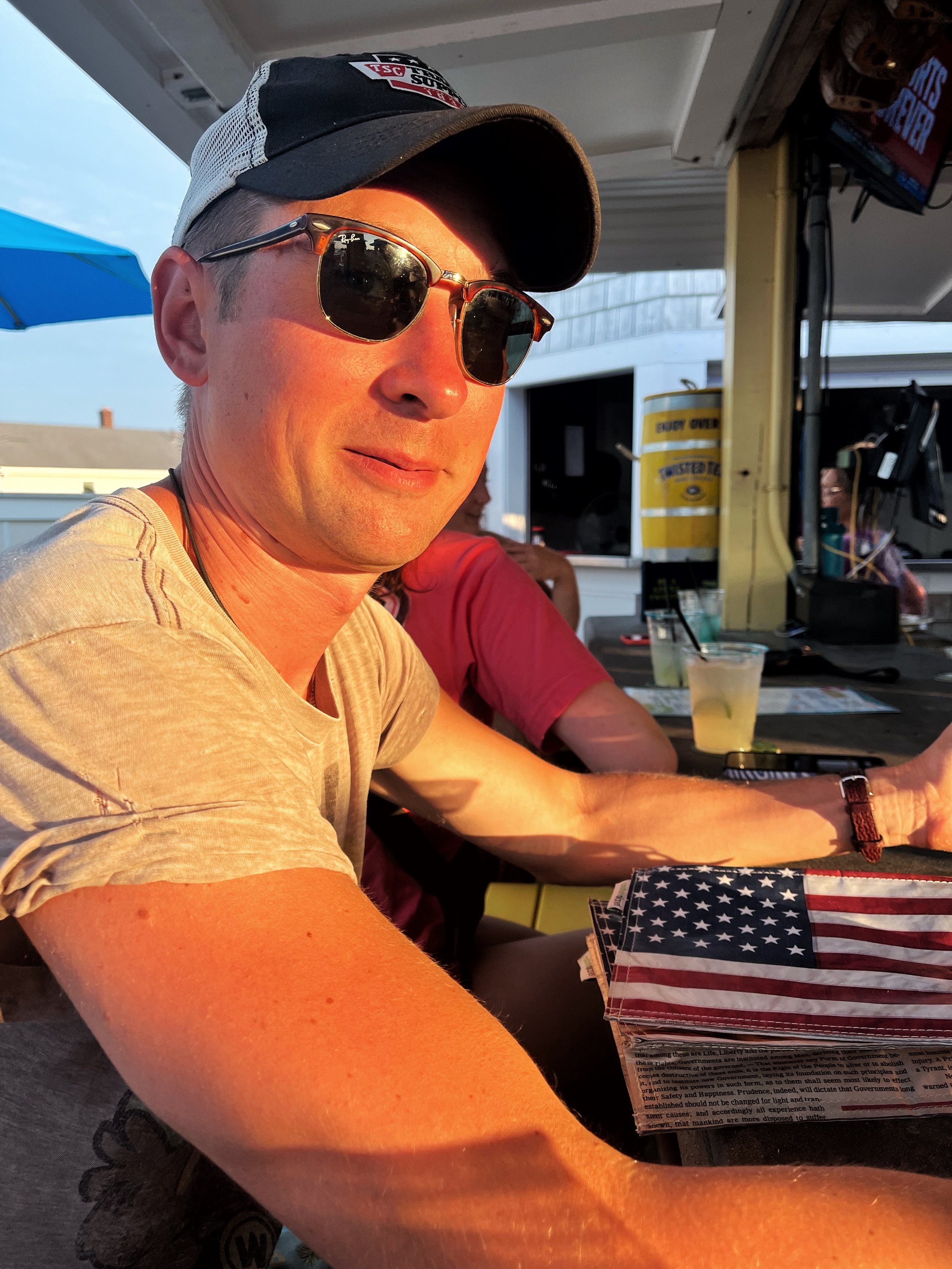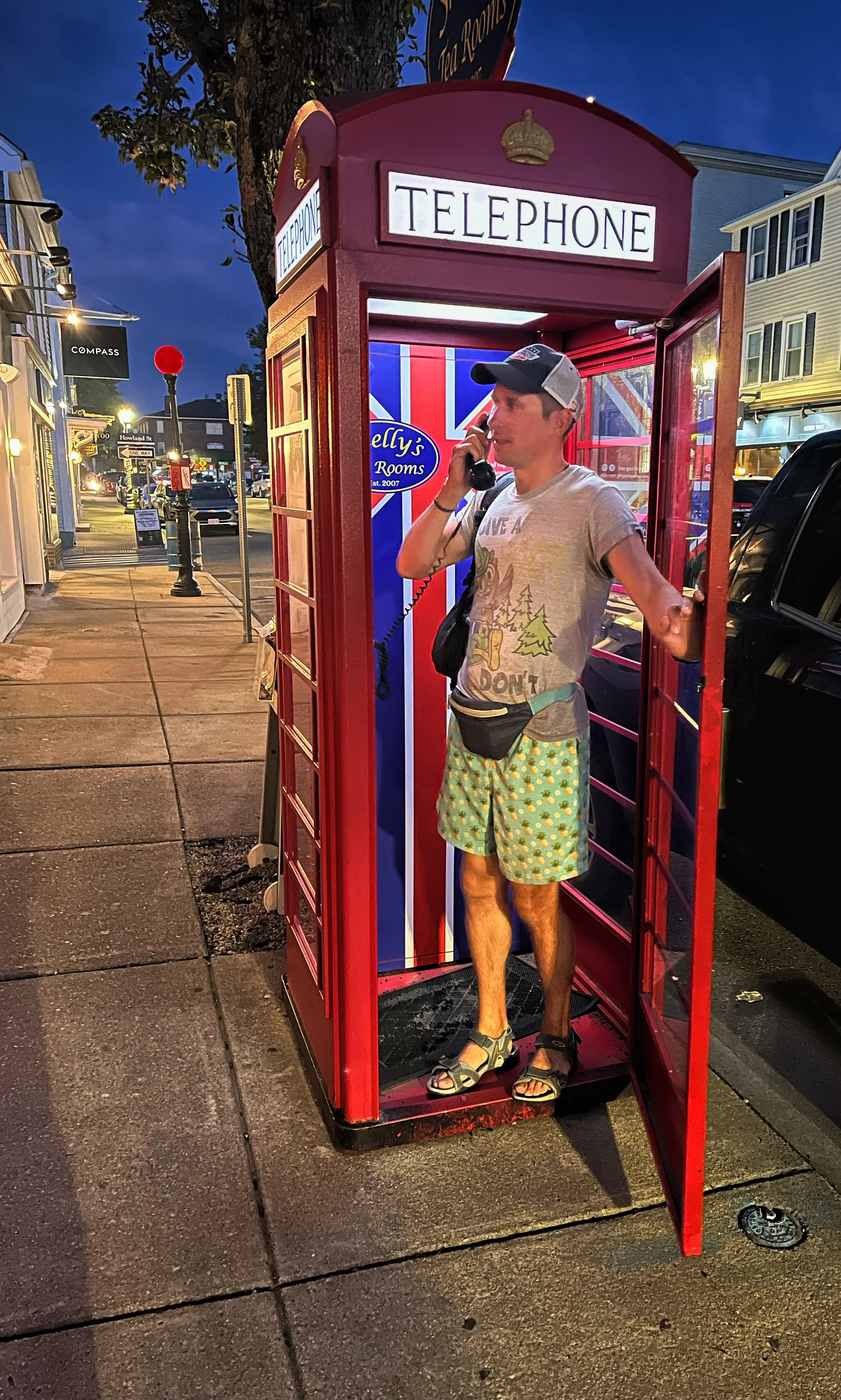Marblehead: Mattsachusetts
This is the Life of Matt.
*Note: All photos were taken with iPhone. For this trip, the big boy camera stayed home.
I just finished four days in Massachusetts. One in Plymouth, three in Marblehead/Swampscott/Salem/Lynn (they’re all one town, but not really).
I was visiting my friend Matt, whom I first met in Portland, OR. Matt and I have been friends over eight years now and truly, I’ve never met anyone like him.
Matt is 38, biologically, but has the motor of a six-year-old. This trip, every morning I’d wake up and hear him already in the kitchen, wide awake, manically preparing breakfast or backpacks for the day because let me tell you: When you’re with Matt, as soon as you get up, it is time to GO.
Workwise, Matt’s in transition. He’s working for his Mom at the moment, who makes these really cool handbags out of recycled newspapers and famous headlines. He’s doing her social media, plus sales & marketing, which means he’s peddling these bags to any living soul who will listen. Throughout our trip, anytime we were at the bar talking to women, he’d whip out the clutch and the handbag, give them the spiel, and gather their feedback.
I sense this transition is challenging for Matt — after all, that boundless energy needs to go somewhere. When we first met, that outlet was The Toads, a three-person pop punk band that he poured his living guts into. Yet for whatever reason, the band never took off. Matt bounced around a little after that — moving to a tiny town in Texas, then back to Portland, and now he’s in Marblehead, right next to his hometown, Swampscott.
Before all that, Matt was an honors student. He started at UMass, then transferred to Northwestern. Then he dropped out. I asked why, on this trip, he never finished. “It felt like prison,” he told me. “I kept thinking how I was stuck in here, and life was happening out there.”
So Matt started hitchhiking, first through the US, then down into Mexico. Along the way he met a Texan named Kyle, a wildly talented yet troubled musician. The two of them busked and wrote songs and met girls and I’d have to guess, from the way he talks about it, those were some of the happiest days of Matt’s life.
Matt with the bags — getting ready to make the pitch.
Marblehead is a gorgeous coastal Massachusetts town with little green islands, smooth coastlines, and old colonial homes built in the 1700s. I was there for the Fourth of July. So while everyone was celebrating the birth of America, I was in the place where it was first conceived.
I came for a few reasons. One, I wanted to get out of the city. Two, Matt hasn’t stopped talking about this place since I first met him, so I had to go see what’s up.
And let me tell you, it lived up to the hype.
What Matt loves most, and what he was so sorely lacking in Portland, is that this place is a social free-for-all.
There is no such thing as a private conversation. Anyone can interrupt or hop into any conversation they please. It’s not only okay, but encouraged.
You can also call anyone anything you like. On the surface, people seemed almost aggressive — maybe it was their bluntness, maybe the thick New England accent — but inside, they are pure mush. You can see it in their eyes. I got the sense they didn’t mean what they say, nor mean to be mean; they just liked to see what you’re made of.
And Matt thrives in it.
“Ladies, where you going, the night’s just getting started!” He yelled this to two women in their late 80s. They were walking to their car after the fireworks. They heard him, stopped and laughed. “Maybe next time,” they yelled back.
Then there was Dickie, a bartender in his late 70s, who came onto the bar deck to talk to the women we’d just met. “So you’re in your 70s now,” Matt said to him. “Yeah, and if I was 45, I’d kick your ass right now,” Dickie said back in his heavy accent. He talked for awhile, then made his way out. “You two boys are clearly punching above your weight class with these women, but that’s just me,” he said. “OK, I’m going home.”
Or there was Dennis, Matt’s favorite. Dennis was a tour guide on a boat that Matt booked for us fifteen minutes after I got off the bus. After Dennis’s tour, Matt went up and talked to him. Matt brought pepperoni and cheese to snack on. As he and Dennis were talking, the boat still cruising, Matt pulled out the bag and started eating. He handed Dennis a piece of pepperoni and Dennis, without asking or breaking conversation, wordlessly took the pepperoni and ate it.
Afterward, Matt couldn’t get enough. “He didn’t ask about it, didn’t decline it, didn’t say anything. He just ate that pepperoni right out of my hand,” he said. “That just wouldn’t happen anywhere else.”
It’s freeing, to be in a place like this. It felt like a time before phones or dating apps, before we became so afraid to talk to each other. And it felt like an especially stark contrast to New York City, where the cardinal rule of “mind your business” reigns supreme. Granted, people in New York can be surprisingly open and chatty, but I still feel this sense of “closed-off-ness” that gives me pause or hesitation before approaching strangers.
In Marblehead, that simply does not exist.
One night, I was out with Matt and his two friends. Matt was never by our side for more than three minutes. “I’ve never seen someone who’s not on coke act so thoroughly like he’s coked up all the time,” Matt’s friend said to me.
As Matt made his rounds, everyone loved him. This surprised me — not because of his personality, which is charming and confident and super quick-witted, but because of his outfit: Matt, for four days, morning afternoon and night, wore his mid-thigh bathing shorts, a severely worn out shirt of a barely-visible owl saying “Give a Hoot, Don’t Pollute,” a fanny pack, and at the end of his skinny beanpole legs, Tevas.
For four days, Matt and I did not stop. We rode bikes in the morning, where Matt pointed out every detail he knew about the town, as well as every detail from his childhood, and then every detail from the childhoods of people I’d just met, or never even knew. We biked, we swam, we ate, and we drank. Boy, did we drink.
At the end of the trip, I took a train from Salem to Boston, in order to catch my bus. I sat down to do a crossword puzzle. After two clues, I was asleep in another galaxy.
I found Marblehead absolutely delightful. But while I was there, I kept wondering, are the people happy here? And maybe what I meant was, would I be happy living here?
I wasn’t there long enough to know. Yet upon arriving back in New York, I noticed something funny: I was longing deeply for my hometown, Vero Beach.
This was odd, as I’ve never felt that. I left Vero as soon as I could and I hardly go back, save for major holidays or occasions. But Marblehead reminded me of Vero — coastal, quiet, peaceful…and controlled. I don’t mean that in a condescending sense; it’s just how smaller towns seem to work: you know who you’re gonna see and what you’re gonna get.
To me, that always felt confining, predictable. Boring. And I assumed the people who lived there felt that way too. But now, after spending a few days in the comfort of Matt’s oldest friends and homiest bars, I have a new word for it: familiarity.
In New York, nothing is familiar (at least to me). Places change, people move, everything is always in flux. This is what makes the city so damn exciting. You can walk into the same bar twice and have completely different experiences. Nothing repeats itself in the grand city of New York.
But to me, what you gain in novelty, you lose in intimacy.
When I got back to New York, it wasn’t the beaches or sands of Vero that I was missing, but the warmth of familiarity. I wanted to talk to someone who’s known me my whole life, who knows me in that way. I found myself wanting to return to Vero and learn more about it, maybe even write about it.
Most of all — and this didn’t dawn on me until right now — I realized how much I’ve been rejecting my hometown as part of who I am, and that perhaps now it’s time to formally embrace it.
On one of our beach mornings, Matt and I were walking to our bikes and I brought up a quote from Joseph Campbell, about the Hero’s Journey. He said when you embark on the journey, your friends will first seem like enemies, and your enemies will seem like friends. This made sense, as I strongly disliked Matt when I first met him — he was a total asshole — and yet he became one of my strongest and most loyal friends. Matt agreed with the quote. “It’s not what you say to people, it’s what you do,” he said. “It’s about your actions.”
Earlier I said that Matt’s in transition, looking for somewhere to place all that creative energy. But ever since I’ve known him, whether it’s a job or a band or whatever else, Matt’s poured himself relentlessly into the people around him.
For one, Matt never misses a birthday, ever. My apartment is filled with customized coffee mugs ordered from Walgreens, featuring images and collages like my disembodied head Photoshopped between he and a friend, or us visiting a corn maze together, or an old photo from my Bar Mitzvah. Matt texts me every Jewish holiday, in proper Hebrew no less. He remembers all the important details I share with him, and even follows up about them. I’ve got postcards all over my fridge from him, many of them without a particular occasion. And after each time we see each other, Matt shares the photo album from our trip. It’ll contain at least 400 images, and almost none of which feature the landscape, the food, or the sunsets. They’re all of me and him.
So yes, while it’s a joy to find something professionally or creatively to really sink your teeth into, that’s just one facet of life. And maybe that thing comes once you’ve found a place where you feel you truly belong. Who knows.
But from what I’ve seen, whether Matt’s back in Marblehead for a minute or for a lifetime, it’s so satisfying to see him so firmly in his element: smacking hands with kids on the sidewalk, handing out pepperonis, hawking handbags, asking 80-year-old women out on dates.
One time back in Portland, many years ago, I asked Matt: What’s your favorite place on Earth?
“Oh man,” he said, “a foldout chair on the sand of my hometown beach.” He said it without hesitation, in such a way that I could see it and feel it myself.
“There’s no place I’d rather be.”








